Endeavo(u)r and I have a History. So if you’re looking for a straightahead (p)review of Endeavor: Deep Sea, then I suggest you check out the excellent video from Before You Play which will bring you up to speed. This article is more of a deep dive into the design’s evolution, as well as thoughts on its suitability for both fans of the old Endeavor and people coming to it fresh.
So, with that being said, let’s dive in…
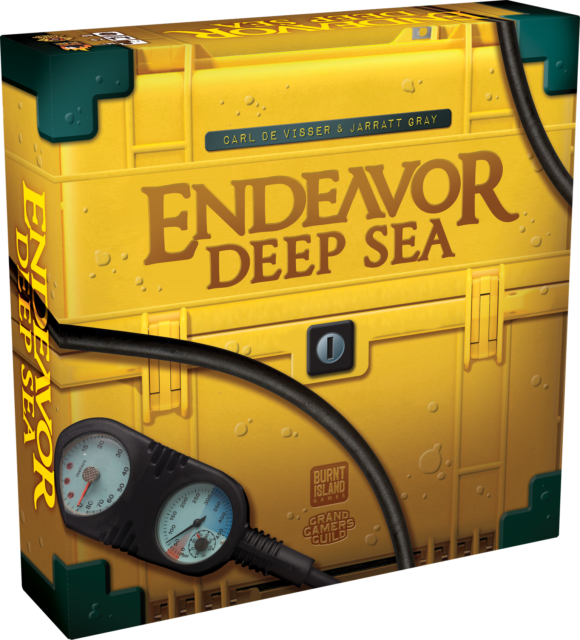
I played the original Endeavor soon after it came out, in 2009. I was excited by the theme, hoping for a lighter version of something like Struggle of Empires, Martin Wallace’s game of European hegemonic expansion in the 18th century. Instead, it felt like a straight-ahead Euro–nothing particularly historic about it, could have been set in any period, completely symmetric and nothing to distinguish one nation from another. One play was enough to make it a hard pass. In 2011 I found the game I wanted Endeavor to be in Colonial: Europe’s Empires Overseas by Christophe Pont. I still recommend it.
So when in 2018 I heard Burnt Island Games was going to re-issue it, and I asked myself, “Why?” Full disclosure: I know the folk at Burnt Island Games. I’ve played games with them in their dining room. I wouldn’t flatter myself to call myself their friend–but I do like them personally and am rooting for them. So I was concerned they were backing a pretty lame horse in what came to be called Endeavor: Age of Sail. I didn’t back it on Kickstarter–but I was willing to give it a go when my friend’s copy came in.
My experience this time was much more positive. Gameplay-wise it was pretty well the same, but my tastes had shifted in the interim so maybe I was expecting less of it in terms of being a sim. And there was no doubting the components had received major upgrades: bespoke building tray; wooden counters; and of course the usual excellent graphic design treatment courtesy of Josh Cappel. Or maybe the people I played with were just more fun.
In any event I felt major FOMO and pretty well immediately went to get a retail copy and hope I could trade up to a KS version one day.
I didn’t have to wait long. A year later Burnt Island announced the appropriately-named Age of Expansion which introduced a ton of historical chrome to satisfy my consim brain as well as–huzzah!–a component upgrade add-on. Alas, although the expansion delivered on time, that time happened to coincide with the first wave of COVID, and so my copy’s been sitting gathering dust since then. No solo mode, y’see–though I spent quite a bit of time in early COVID working on one.
But there was another problem besides COVID that Endeavor (and Burnt Island) had to deal with, namely slavery. More specifically, the game’s treatment thereof. Age of Expansion released right around the time of George Floyd’s murder and the sparking of worldwide BLM protests. Because slavery was a game mechanic, Age of Sail/Age of Expansion became to be seen as problematic. To many, it was just another game which celebrated and incentivized European colonialism. (I happen to be in the minority who feel this was an unfair assessment–but this might be biased not only because of Sunk Cost Fallacy but also my acquaintance with Burnt Island.)
Anyway, it was not too surprising to me when I started to hear murmurs through my grapevine that Burnt Island has begun to work on a new new Endeavor, this time with a contemporary theme of ecological conservation. After all, since the “bones” of the design were solid, a new version would not have to start from nothing and hence would cost less to develop than an entirely new design. Furthermore, a successful re-branding would accomplish several goals at once: it would take advantage of the current boom in nature-themed games (Cascadia; Ark Nova; Earth); strong sales could compensate for the drying-up of the AoS/AoE franchise; and certainly not least the “green-friendly” theme would hopefully burnish Burnt Island’s image and sweep away the ashes of the whole “slavery” issue.
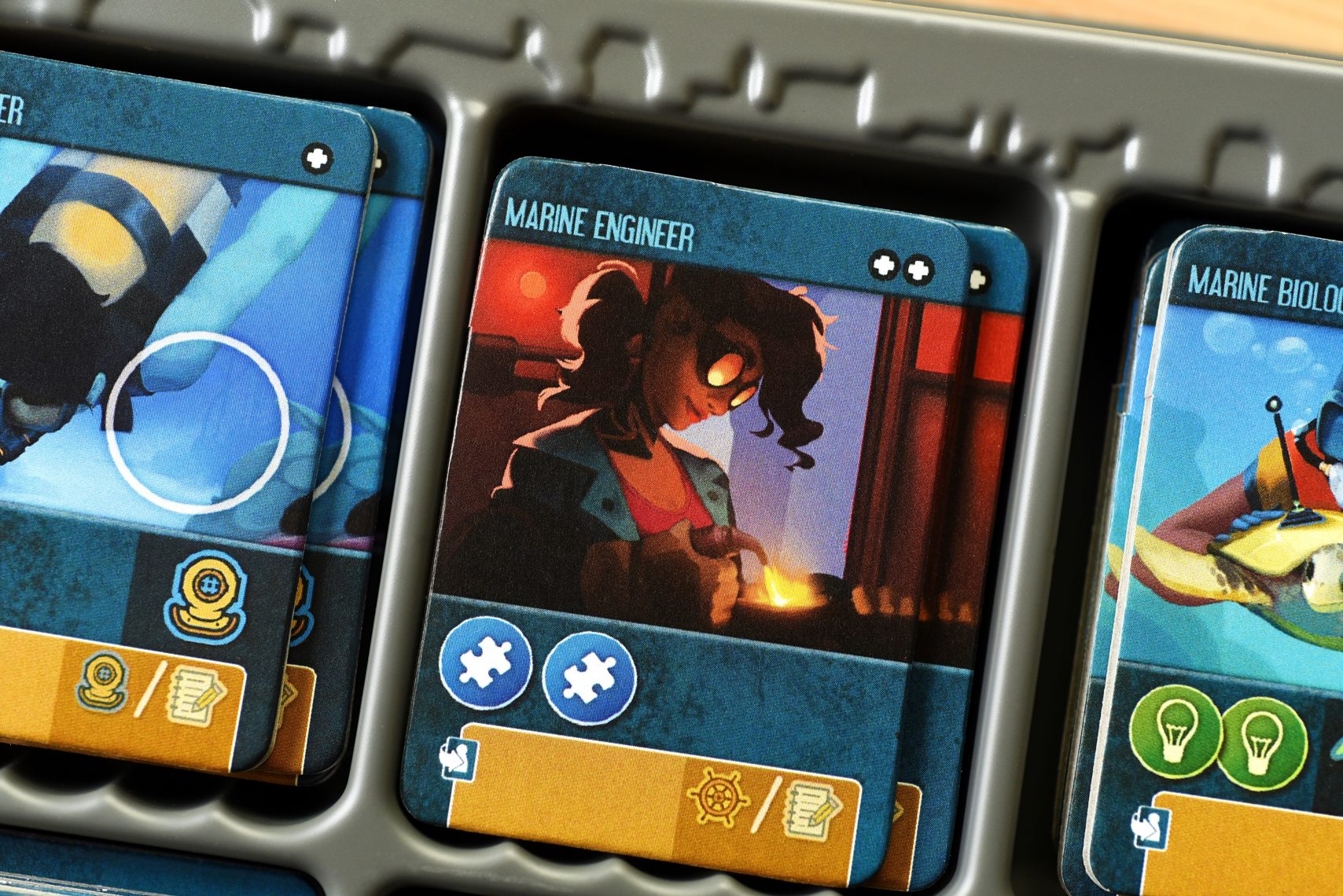
Which–finally–brings us to Endeavor: Deep Sea. In E:DS players are present-day oceanographers/environmental stewards, mapping and preserving the aquatic world–and definitely (the rules take pains to emphasis this) not harvesting or extracting anything.
The first thing that will inevitably strike any AoS/AoE player is the lack of a single mapboard. Instead, the game plays out on large tiles the rules call Ocean Boards. Furthermore, at the start of play only a few specific Ocean Boards are visible and available to take actions on; players will have to explore and discover new areas to achieve their goals and/or earn VP’s.
E:DS is scenario-based now, following the lead of several other recent non-RPG Euros which want to lean into “replayability” (Maracaibo, The Crew, The LOOP). Furthermore, like Maracaibo, Root, Obsession, and so on, E:DS also offers competitive, co-operative, and solo modes for each scenario. So many ways to play! So much value for your money! I mean, I’m surprised there isn’t a semi-co-op mode with hidden traitors, too.
Okay, I’m being harsh and/or cynical. As in the current crop of AAA video games, designers and publishers want players to play it their way. God forbid they should alienate any part of their potential audience. Of course, from a developer’s point of view, splitting your attention trying to make a game work in so many missions and modes makes it harder to guarantee that any single iteration will be any good…but that is the price we as gamers pay for demanding all games suit our individual tastes.
Anyway. I played the second scenario (the first one being very introductory) in competitive mode and it was very, very good. It turns out that the mechanics of AoS/AoE mesh a lot more naturally (in my opinion) with the theme of ocean exploration and conservation than they do with colonial-era European expansion. Four of the five attribute tracks work exactly as they did before, even if they’re called different things.
But there is a missed opportunity in the rules to really mesh theme and mechanics, and that is in the treatment of the action economy, as personified by the action discs. They’re just called “discs” in the rules and they’re never explained or motivated, they’re just things you move on and off your crew members and onto the Ocean Board. (I forget if this was also true in AoS/AoE.) Actually concretizing them as units of energy, time, or effort would be a tiny thing but would go a long way to really integrating the whole system thematically.
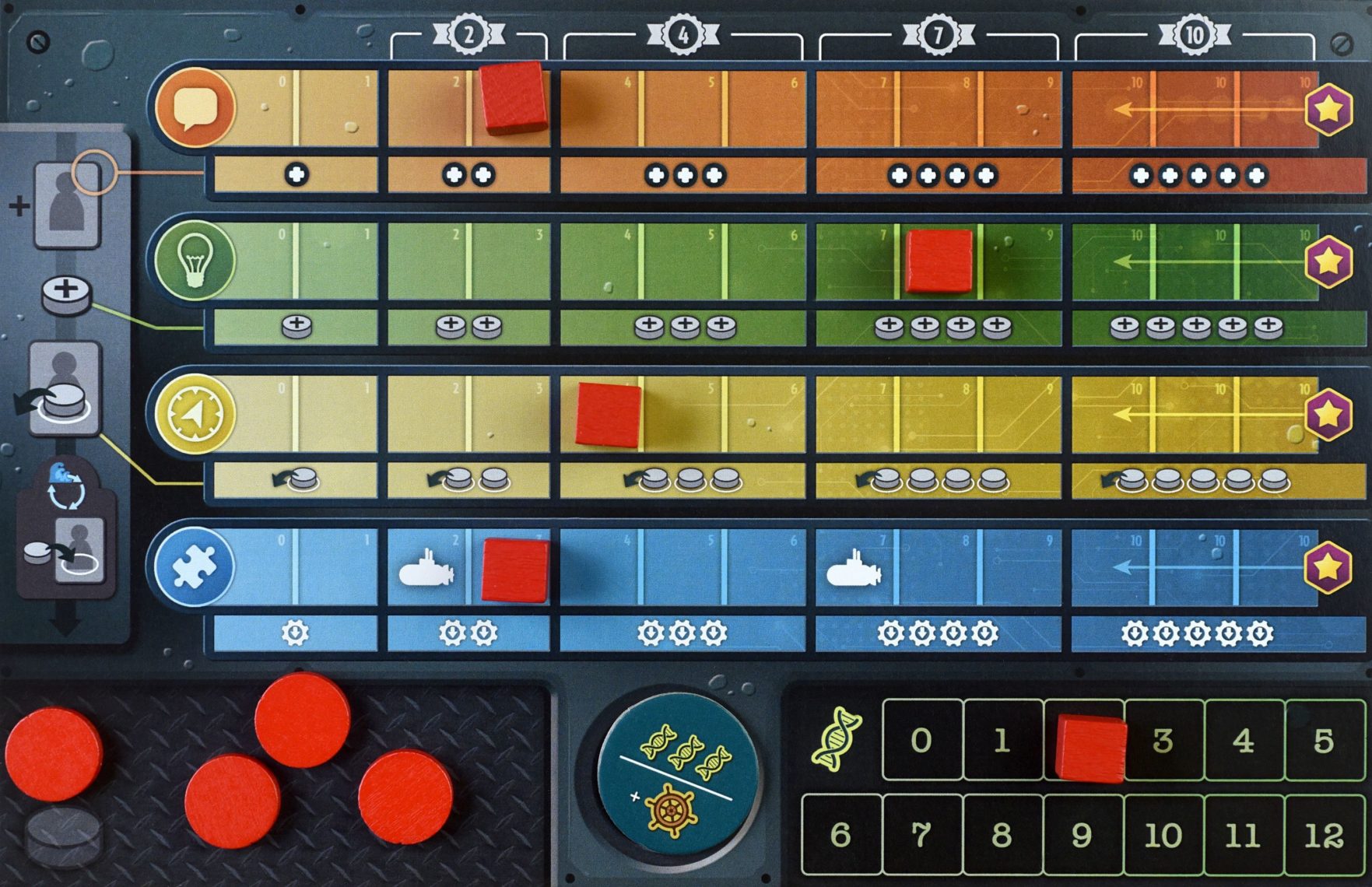
The game phases play out exactly as in AoS/AoE: you start by hiring a new crew member (who’s skill level depends on your Reputation attribute); then you refresh your action economy; and then you take turns taking actions. It’s the actions which differentiate E:DS from its predecessors, which makes sense given the change in theme. And those changes totally transform both the narrative and mechanic experiences of the game.
In AoS/AoE, most of your VP were usually coming from a combination of your attribute levels, Influence Cards, and board presence. You generally needed to begin the game by scanning the board to see which shipping tracks had been seeded most advantageously, and then, your initial choices for buildings and trade actions would be heavily predicated on depending on turn order. Since the order of Influence cards were always the same in every Region, you could predictably strategize around those as well.
All of that goes out the window in E:DS, and I would go so far to say that players coming to it fresh are at an advantage because AoS/AoE veterans are going to have to unlearn before they can learn new tricks.
This is because–at least in competitive mode–where your VPs come from seems to change considerably from scenario to scenario. Turn order is still important, because the board space or Journal card you want could be sniped before you get to it. Boosting your attributes is still a Good Thing, too–but because most of the board is unknown until discovered by Sonar actions, you cannot usually count on boosting any one particular attribute. You will need to be flexible. Sonar actions are key, not only rewarding you for placing new Ocean Boards but also giving you the power to choose what those tiles will be, and hence what rewards will become available, as well as where they will go. This is a smart design choice, because it incentivizes actually opening up and expanding the map. Tiles at deeper levels add even more spiciness by having unique rewards or spaces which play around with the game’s formulae.
Board presence is still very important. The gains you get from Sonar and Conserve actions can be considerable, and most of the goals I saw depended on having discs on the board. Conserve actions seem to be the main way to boost your Reputation, which affects the level of new crew members you can hire. However, they almost always require you to spend the new in-game currency Research, which you generally get from Diving tokens, a new mechanic which adds further unpredictability. Research is also crucial for Journalling (see below).
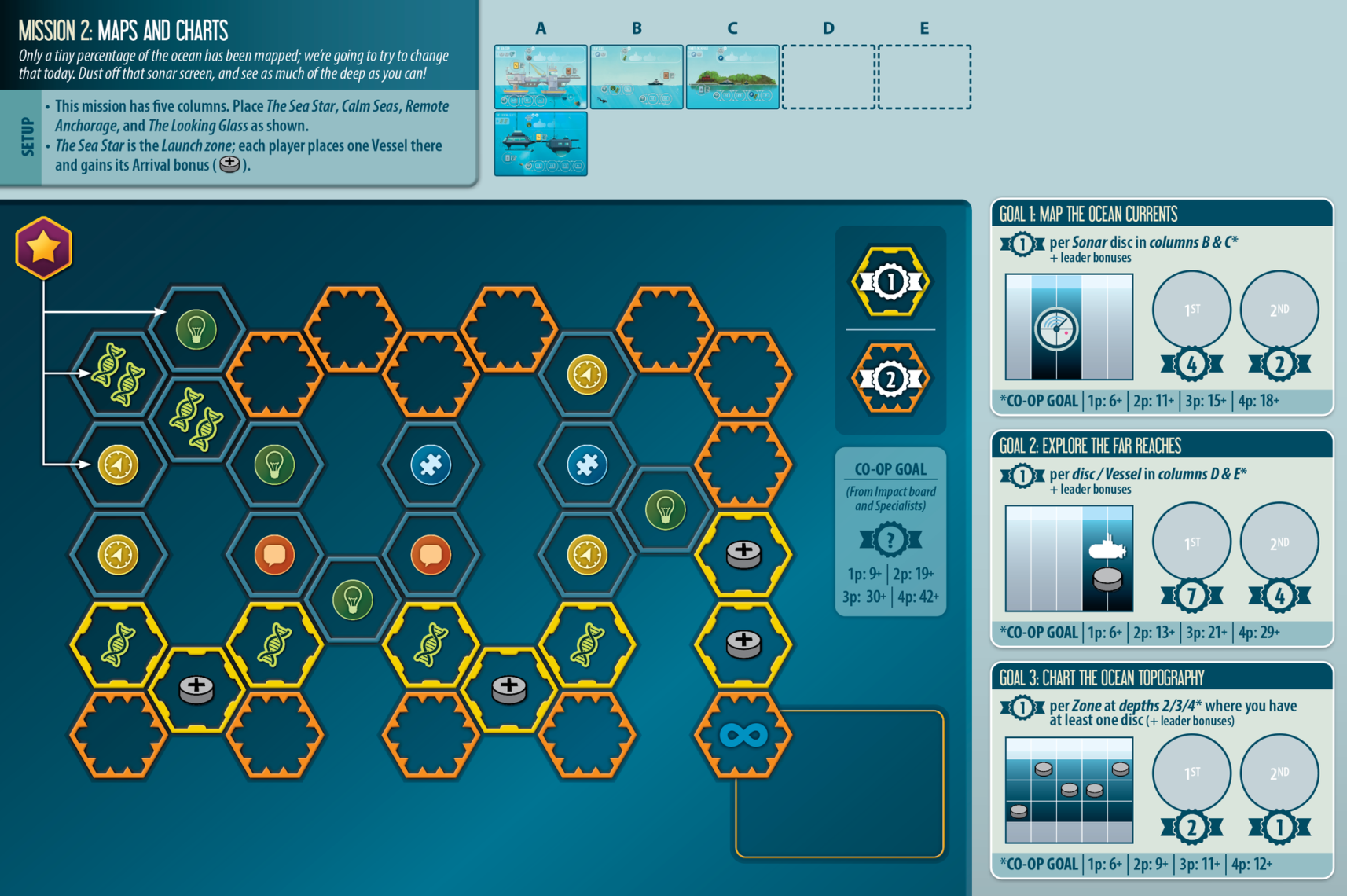
The Impact minigame is cute because it’s semi-co-operative, in that players add to the Impact grid collectively expanding outward from a starting point. Therefore, your reward options at any one time depend on where the cubes have been placed already. In competitive mode, this means you may want a particular reward but don’t want to make even better rewards available once your cube has been placed.
Finally, instead of Influence cards you have the Journalling action which lets you purchase Journal “pages” using research, which is the main way to upgrade your crew. Plus some give you pretty powerful ongoing powers.
All of which to say that, while the gameflow of E:DS is very straightforward and newcomer-friendly, I would argue that the interplay of the new actions makes the “play space” much more complex than in AoS/AoE. However, the better thematic integration–plus the absence of combat mechanics–would I think make it a much more inviting experience. This is also helped by the excellent artwork and graphic interface; the Ocean Tiles are really quite beautiful, and the iconography is very intuitive–except for the icon for “raise your lowest stat by one”, whose chevron confusingly points downward.
The lack of combat which I mentioned above may be a turnoff for some; I would argue that there’s still plenty of opportunity for indirect screwage via grabbing of board spaces and Journaling cards.
The real beauty of E:DS is the obvious potential expandability: more scenarios; more tiles; more crew member types, etc etc. A commercial tie-in with Spongebob or Aquaman is also definitely do-able.
I didn’t get a chance to try a scenario in co-op or solo mode. From what I saw, co-op is about helping each other fulfill as many goals as possible; three are adapted from the competitive bonus VP goals set by the scenario, and three are randomly-generated from a small deck of possibilities. Solo is basically just one-player co-op plus you get seven instead of six rounds, which is a bit disappointing. I would have preferred playing against an automa/bot but definitely understand how hard that would be to design in such a modular playspace. All of which seems perfectly fine but am not sure how fulfilling it would feel compared to a game which was designed specifically around co-operative/solo play.
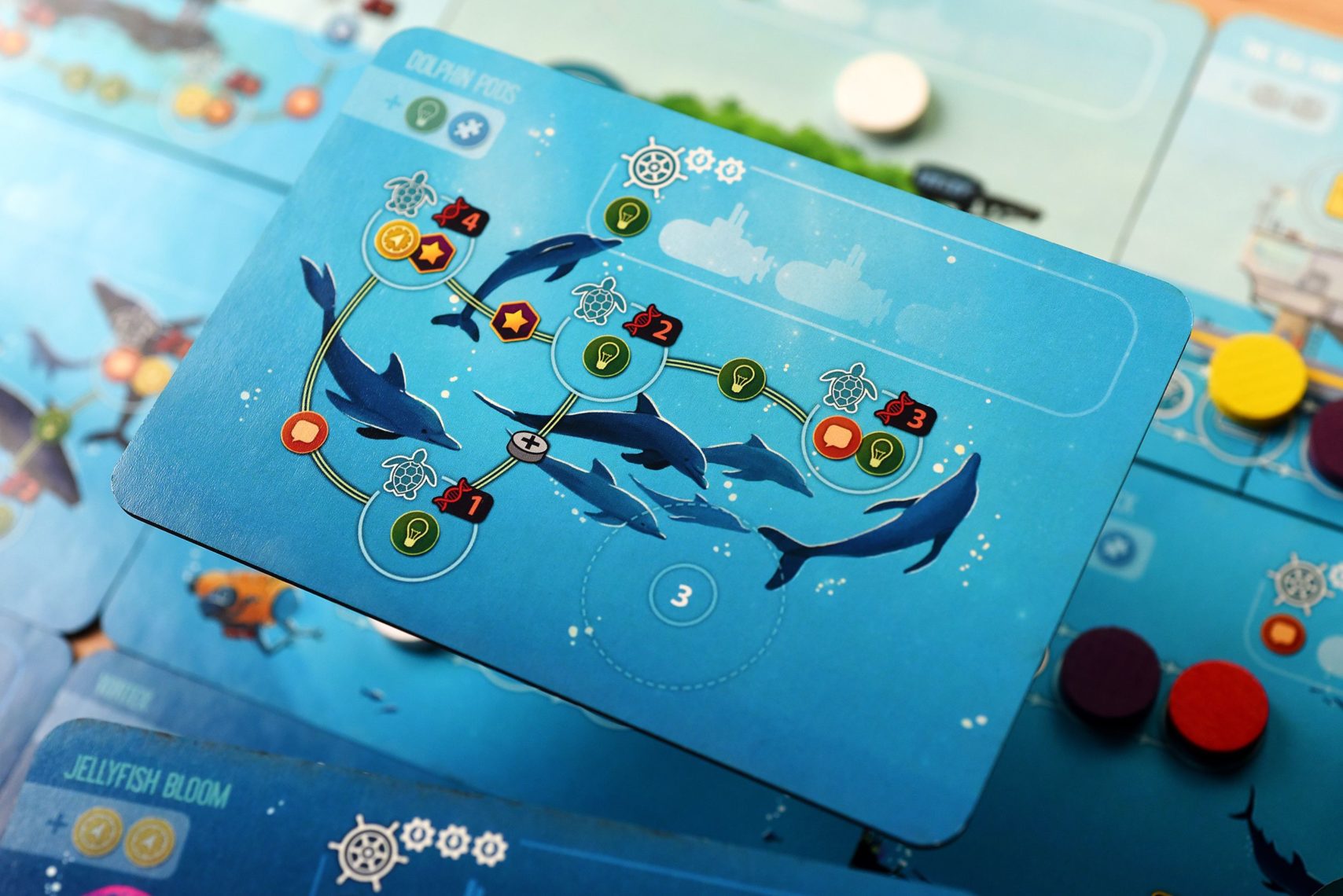
So. If you are a fan of AoS/AoE will you like E:DS? That depends on how much theme matters to you. Mechanically I think the game is richer and hangs together better, but I admit I missed the historical theme a bit. I also do admire the new environmental focus–especially because Burnt Island is trying to walk the walk by committing to a component tray made out of recycled materials, which I applaud. But if the theme change turns you off, I’d say go track down a copy of Colonial: Europe’s Empires Overseas; you won’t regret it.
Meanwhile, if you are coming to E:DS not having played the previous iterations then you are getting a state-of-the-art design which hangs together excellently with the theme and can be enjoyed at all levels of experience. Not to mention all that replayability, which, considering the deluxe pledge is only US$69, is excellent value for your money. I’d say take the plunge.
Thanks to Sean Jacquemain of Burnt Island Games for letting us try the most recent prototype of Endeavor: Deep Sea. Many of you will also know that Sean is also the founder of The Daily Worker Placement. I was a Day One backer of E:DS before I was offered the opportunity to try out the prototype, so I’m putting my money where my mouth is.
Excellent write-up, most of which I agree with. The multiple scenarios and modes made me fear that the game itself needed them to seem good.
But after one play, and further thought about the game, I am very much looking forward to playing again. Thanks for the photo of Mission 2 (we played 1).
My session report at: https://boardgamegeek.com/blog/12977/blogpost/181744/endeavor-made-impact-but